a blessing for deeper knowing
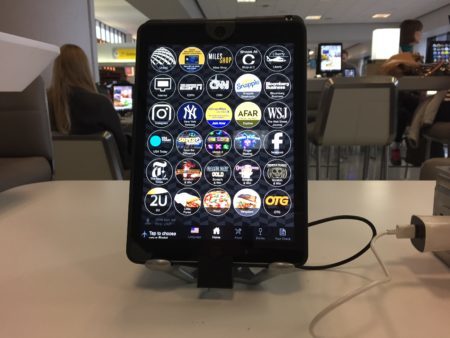 “In a real sense all life is interrelated. All persons are caught in an inescapable network of mutuality, tied in a single garment of destiny. Whatever affects one directly affects all indirectly. I can never be what I ought to be until you are what you ought to be, and you can never be what you ought to be until I am what I ought to be. This is the inter-related structure of reality.” ~ Rev. Martin Luther King
“In a real sense all life is interrelated. All persons are caught in an inescapable network of mutuality, tied in a single garment of destiny. Whatever affects one directly affects all indirectly. I can never be what I ought to be until you are what you ought to be, and you can never be what you ought to be until I am what I ought to be. This is the inter-related structure of reality.” ~ Rev. Martin Luther King
I spent a good part of Sunday flying from New Hampshire to Asheville, North Carolina, to visit my younger son Jack. I love this kind of low-stress travel day, especially when what’s waiting at the end of the journey is not a professional obligation, but simply a change of scene and a son to wrap my arms around.
En route, I buried myself in a book. But a lay-over in Newark gave me an opportunity for people watching. It’s been a while since I passed through a state-of-the-art airport, so I was unnerved to see electronic tablets attached to the top of every flat surface. The restaurant tables all feature a pair of devices set up back to back, so that people sitting across from one another will find themselves gazing at hi-def photos rather than into each other’s eyes. Any hope of leaning in and conversing with a friend or loved one while sharing a meal is extinguished by an electronic barrier of flashing pixels.
I stood for a while at one cafe where adults and children alike were intently focused on the technology, heads bent, leaning toward their personal screens as if magnetized. Couples and families occupying the same tables were clearly inhabiting different online universes. Everyone was staring and tapping and swiping and typing. No one was paying attention to the person across from them. No one was talking. No one seemed to be really “there.”
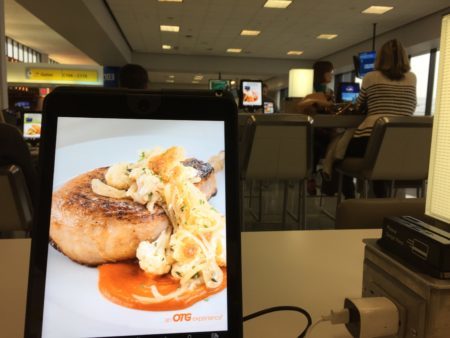 Taking a seat near my gate, I found my own eyeballs inexorably drawn to the bright screen where a fine scotch was being poured over ice. The drink was replaced by a pasta dish puddled in sauce, which made my stomach rumble and which was available packed to-go if I tapped right now and placed my order. The meal gave way to a video of a couple walking hand in hand on a beach I could visit, should I care to make a reservation.
Taking a seat near my gate, I found my own eyeballs inexorably drawn to the bright screen where a fine scotch was being poured over ice. The drink was replaced by a pasta dish puddled in sauce, which made my stomach rumble and which was available packed to-go if I tapped right now and placed my order. The meal gave way to a video of a couple walking hand in hand on a beach I could visit, should I care to make a reservation.
A time traveler from the last years of the twentieth century changing planes in Newark might look around at how we’re living right now, in the early years of the twenty-first, and conclude that human beings no longer have much use for, or interest in, one another. She might assume that we must now need to be attached to machines in order to function, and that our 2017 brains must be wired differently from those of our grandparents. To some extent, the time traveler would be right. And perhaps, after observing for a while, the disoriented twentieth-century pilgrim would find her initial astonishment giving way to musings more akin to my own — a hard-to-articulate sense that something essential to our survival is being lost, something having to do with soul and depth and knowing.
 Last week I posted a link on Facebook to an essay entitled America is Facing an Epistemic Crisis. I’d initially been drawn to the piece because I wasn’t sure of the meaning of the word “epistemic.” I looked it up: of or relating to knowledge or the conditions for acquiring it.
Last week I posted a link on Facebook to an essay entitled America is Facing an Epistemic Crisis. I’d initially been drawn to the piece because I wasn’t sure of the meaning of the word “epistemic.” I looked it up: of or relating to knowledge or the conditions for acquiring it.
My interest was piqued. The essay, which was provocative and disturbing, includes this observation:
The US is experiencing a deep epistemic breach, a split not just in what we value or want, but in who we trust, how we come to know things, and what we believe we know — what we believe exists, is true, has happened and is happening.
The piece is decidedly political and openly opinionated. And David Roberts’s well-informed opinions give way to speculation: what could happen, given where we stand right now. But Roberts backs up his speculations with the facts that led him down this path in the first place. And he is also getting at something much larger and much scarier: the increasingly limited, tribal, pre-packaged, and non-fact-based way we acquire knowledge in an age when we spend so much of our lives online, clicking and scanning, liking and sharing, tuning out (or not even seeing) the truths that don’t align with our beliefs.
I don’t want to live like that.
And so I’m thinking a lot this week about just what and how I choose to “know” in my own life.
On Facebook a friend commented about the piece I’d shared, saying he was put off by the unfamiliar word in the title, and that upon a quick look he’d concluded the author’s assumptions were misguided. Confronted with the daily tsunami of media that pours through my own computer screen, I often catch myself reading this way, too — scanning headlines while trying to keep my overwhelmed brain above water. It’s tempting to dismiss anything that appears too dense or hard or contradictory, while grabbing onto whatever floats by that supports what I already believe to be true. Perhaps I don’t want to “know” as much as I wish to be updated and validated.
As I type these words, I can hear the sound of rain falling steadily. A breeze wafts through an open window. Other than the hum of the refrigerator and an occasional dog barking outside, it’s quiet here in the airbnb room I’ve rented for the week. I have a pile of books on the table next to me, and a letter part-way written that I want to give to Jack for his birthday. Alone with my thoughts, I have plenty of time to reflect on my own uneasy relationship with technology – how it contributes to my awareness of world events while simultaneously weakening my capacity for the kind of deep reflection and processing I need in order to truly absorb and understand them.
To really know anything – be it another person, a language, a skill, an existential threat, or the contents of our own hearts – demands a kind of patience and raw intimacy with truth that seems antithetical to our culture these days. We are so good at skimming, judging, and distracting ourselves that the complex or uncomfortable truth takes a back seat to our desire for instant gratification, quick fixes, and pain-free solutions. It is easier to react than to reflect, simpler to see in terms of black and white than to acknowledge how much of the world is gray, safer to defend a position than to question it, easier to shut down our thinking than to shift it. And yet, as David Roberts points out in his essay, “Truth cannot speak for itself, like the voice of God from above. It can only speak through human institutions and practices.”
Many of us are profoundly worried about our human institutions at the moment, and it’s hard not to feel helpless in the face of so much that’s so wrong. But it’s also dawning on me that If I’m to “know” anything of real value, I must be even more willing to be quiet and to go deep.
What if true knowing begins the moment we’re ready to acknowledge all that we don’t know?
Knowing deepens every time we step into someone else’s ill-fitting shoes and walk in them. It happens when we recognize the difference between facts and feelings, when we wrestle with real ideas rather than seeking refuge in ideology. To know is both to doubt absolutes and to stand firmly on the side of truth. It is surrender to life as it actually is, even as we step forward to change that which can be be made better. (Witness yesterday’s elections!) Knowing means greeting those who are different with radical compassion and those in need with generosity and friendship. To know is to observe and to wonder, rather than surrendering to easy preconceptions, reductive labels, and media bias. It is to replace pedagogy with curiosity, prejudice with open-mindedness, posturing with humility, habitual distractions with cultivated attentiveness. It is to say, “Maybe I’m wrong about this.” Or, “Tell me what you know.” And then it is to do the hard, necessary work of showing up, digging in, and learning more.
We honor truth in our lives when we invite complexity and discomfort and uncertainty into our conversations and into our relationships. And we begin to know in our bones what is true when we turn away from the glib gratification of the news cycle and the stimulation of our devices, and turn instead back toward each other – in airports, on the street, at our own dinner tables, in works of art and literature.
To know is to listen more and to speak less. It is to release our grip on the need to be right or popular or powerful. It is to question our assumptions, to reject pat answers and political rhetoric and mindless rallying cries. To know requires us to read and think deeply, to write and speak with integrity, to wrestle with complex ideas, and to lift our eyes to the messy, beautiful, big picture that’s the real world, rather than staring down at the tiny one that fits in the palm of our hands.
This work of knowing begins anew each day, with our own quiet recommitment to truth in all its painful, beautiful, and confusing complexity. And truth, of course, begins with me: the truth of who I really am, the truth of what I say and do, the truth of the consequences of every choice I make. So it is for each of us.
The world we live in today is a world we have created together – a world of post-facts, cynicism, distrust, and deep division; of amoral politicians, well-paid lobbyists, and corporations masquerading as citizens; of Facebook, Twitter, Breitbart, and Fox; of a dangerous president propped up by big-money politics, brutality and bigotry; of climate change and mass shootings and saber-rattling threats of nuclear war. It seems as if we have built this world while in the grip of some terrible trance, a collective amnesia that denies our own deepest knowing: namely, that we are all connected, not by algorithms but by grace, and that my survival depends on yours.
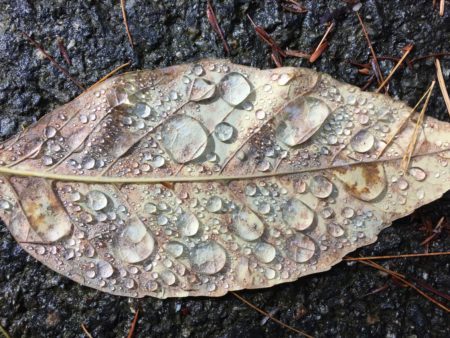 And yet there is also a kind of knowing that surely does still reside somewhere in each of us, if we can be quiet and tender enough to call it forth. Walking through the autumn woods yesterday with Jack and his dog, reaching toward the sky in yoga class this morning, chatting on the phone with my husband, splashing through puddles on my way back to this room, I found my heart uplifted in spite of everything that conspires to bring it down. There is such mystery and joy in the moments when we are fully and gratefully present in our lovely, precious, embattled world.
And yet there is also a kind of knowing that surely does still reside somewhere in each of us, if we can be quiet and tender enough to call it forth. Walking through the autumn woods yesterday with Jack and his dog, reaching toward the sky in yoga class this morning, chatting on the phone with my husband, splashing through puddles on my way back to this room, I found my heart uplifted in spite of everything that conspires to bring it down. There is such mystery and joy in the moments when we are fully and gratefully present in our lovely, precious, embattled world.
Perhaps it was not happenstance but synchronicity that led me to these lines by theologian Richard Rohr early this morning as I lay in bed reading and listening to the rain on the roof.
If you asked me what it is I know, I would be hard pressed to tell you. All I know is that there is a deep “okayness” to life—despite all the contradictions—which has become even more evident in the silence. Even when much is terrible, seemingly contradictory, unjust, and inconsistent, somehow sadness and joy are able to coexist at the same time. The negative value of things no longer cancels out the positive, nor does the positive deny the negative.
Whatever your personal calling or your delivery system for the world, it must proceed from a foundational “yes” to life. Your necessary “no” to injustice and all forms of un-love will actually become even clearer and more urgent in the silence, but now your work has a chance of being pure healing instead of impure anger and agenda.
Our future depends upon our commitment to a deeper kind of knowing, on our ability to connect, reflect, and take informed action. To know is not just a choice we make, but a responsibility we bear together. Whether we’ll survive these dark times is anybody’s guess, but I’m pretty certain our best hope of saving our world is to engage with it, to know it more intimately, to accept the challenge of healing it together, not out of anger but with love.
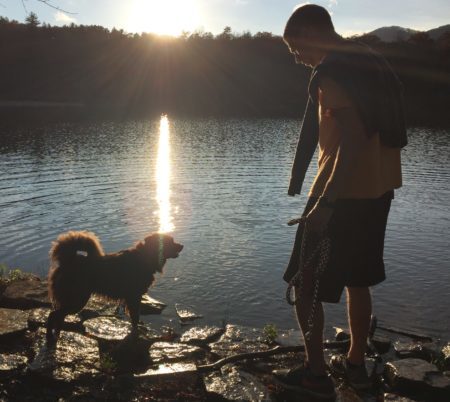 A Blessing for Deeper Knowing
A Blessing for Deeper Knowing
May we take time each day to close down our screens, turn off the TV, and seek to know with our eyes, our ears, our hearts. May we study the lessons of history so that we don’t repeat them. May we read works that challenge our beliefs and open our eyes and remove the barriers between us. May we recite poetry out loud. May we lean in for the hard conversation, take up the good cause, write the check, compose the letter, make the phone call. May we show up with our voices and our feet and our dollars. May we reach out a hand to a stranger, reweave a connection with a friend, go deep into uncharted territory with a loved one. May we set down the burdens of hatred and judgment and fear. May we view all life as sacred. May we listen to magnificent music and visit great paintings, climb mountains and walk barefoot at the shore. May we remember to contemplate the sky, the stars, the dawn. May we nourish our souls with silence and renew our love affair with the earth. May we tend to the children and plants and animals within our reach. May we feed the hungry, care for those in need, and celebrate those who serve. May we transcend our differences. May we tap into our own deep knowing and use it for the good of all. And may we continue to be sources of healing and instruments of peace for as long as we are here. May we raise up hopeful voices in a resounding, knowing “yes” to life.
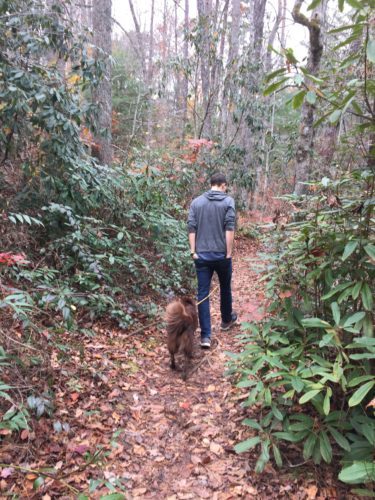
The post a blessing for deeper knowing appeared first on Katrina Kenison.



